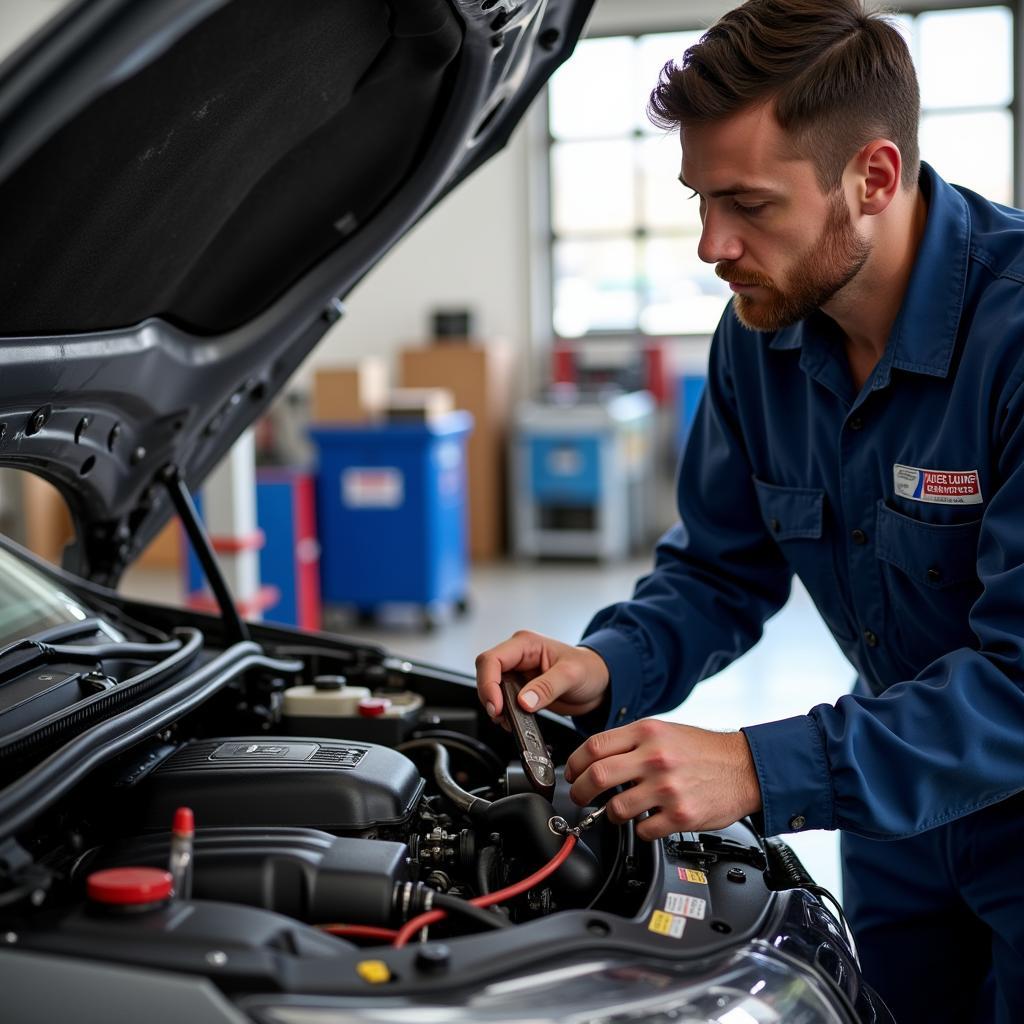A non-starting car is a frustrating experience, and often the culprit is fuel-related. If you’re hearing the dreaded clicking sound when you turn the key, but the engine refuses to roar to life, then you’ve come to the right place. This article will delve into the common fuel system issues that can prevent your car from starting, helping you diagnose the problem and get back on the road.
One possible reason for your car not starting could be a car won’t start fuel pump problem.
Common Fuel-Related Reasons Your Car Won’t Start
There are several reasons why your car won’t start due to fuel problems. Let’s break down the most common culprits:
1. Empty Fuel Tank
This might seem obvious, but you’d be surprised how many people overlook the simplest explanation. Before you panic, double-check your fuel gauge. It’s possible that it’s malfunctioning, giving you a false reading.
What to do:
- If you suspect you’re out of gas, try adding a small amount of fuel to your tank. If the engine starts, you’ve found your culprit!
2. Faulty Fuel Pump
Your fuel pump plays a crucial role in delivering fuel from the tank to the engine. If it fails, the engine won’t receive the fuel it needs to ignite.
Symptoms of a faulty fuel pump:
- Whining noise coming from the fuel tank
- Engine sputtering, especially at high speeds
- Sudden loss of power when accelerating
- Car starts after a few tries but then dies
What to do:
- Listen for the fuel pump priming when you turn the key to the “on” position. If you don’t hear it, it could indicate a problem.
- Check the fuel pump fuse and relay for any signs of damage.
3. Clogged Fuel Filter
Over time, your fuel filter can become clogged with dirt, debris, and rust particles from the fuel tank. This restriction can prevent sufficient fuel from reaching the engine.
Symptoms of a clogged fuel filter:
- Engine misfires or hesitates during acceleration
- Rough idling
- Difficulty starting the car, especially after it’s been sitting for a while
What to do:
- Replacing your fuel filter is a relatively inexpensive maintenance task that can prevent more serious issues down the line.
4. Bad Fuel Injectors
Fuel injectors are responsible for spraying the right amount of fuel into the engine cylinders for combustion. If they become clogged or malfunction, the fuel-air mixture will be disrupted, leading to starting problems.
Symptoms of bad fuel injectors:
- Engine misfires
- Rough idling
- Poor fuel economy
- Smell of gasoline
What to do:
- You can try using a fuel injector cleaner additive as a temporary fix, but a professional mechanic should diagnose and replace faulty injectors.
5. Ignition System Issues
While not directly related to the fuel system, ignition problems are often mistaken for fuel issues. A faulty spark plug, ignition coil, or crankshaft position sensor can prevent the engine from starting even if there’s fuel in the system.
What to do:
- If you’ve ruled out fuel-related problems, it’s essential to have your ignition system inspected by a qualified mechanic.
Another potential car starting issue you might encounter is autostart remote car starter problems, which can also prevent your car from starting.
Troubleshooting Tips
Here are some steps you can take to narrow down the cause of your fuel-related starting problem:
- Check for Spark: Remove a spark plug and connect it to the ignition coil wire. Crank the engine and look for a bright blue spark. If there’s no spark or the spark is weak, you likely have an ignition system issue.
- Inspect the Fuel Lines: Visually inspect the fuel lines that run from the fuel tank to the engine for any cracks, leaks, or kinks.
- Consider Your Driving Habits: If you frequently drive with a low fuel tank, you’re more likely to experience fuel pump problems and clogged filters. This is because the fuel pump relies on fuel for cooling and lubrication.
“A properly functioning fuel system is essential for a healthy engine,” says John Smith, a certified automotive technician with over 20 years of experience. “Regular maintenance, such as replacing fuel filters and using good quality fuel, can go a long way in preventing costly repairs down the line.”
Conclusion
A car that won’t start due to fuel problems can be a frustrating and inconvenient situation. However, by understanding the common causes and following the troubleshooting tips outlined in this article, you can increase your chances of identifying the root cause. Remember, if you’re unsure about any aspect of diagnosing or repairing your car’s fuel system, it’s always best to seek professional help. Contact AutoTipPro for expert advice and assistance at +1 (641) 206-8880 or visit our office at 500 N St Mary’s St, San Antonio, TX 78205, United States.
If you’re experiencing starting issues in the morning, you can find helpful information in our article about car staring is problem in the morning.







Leave a Reply